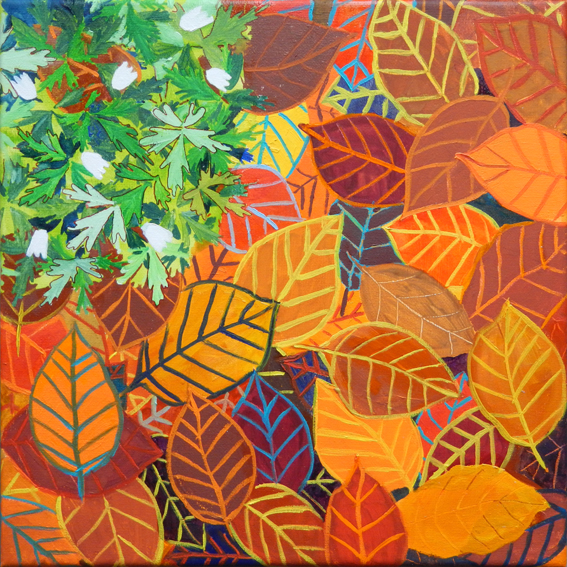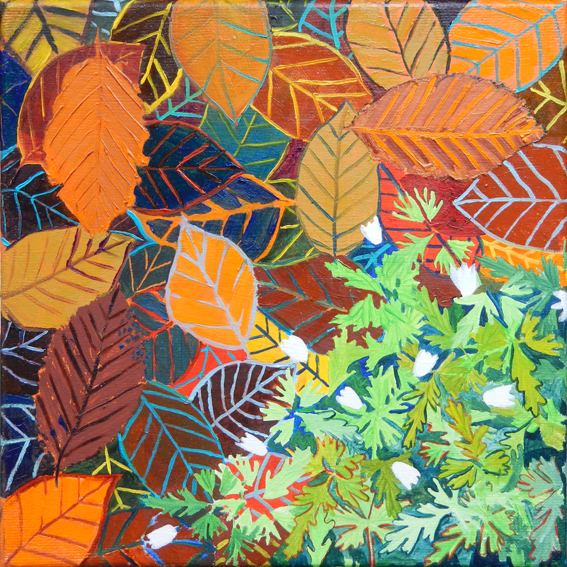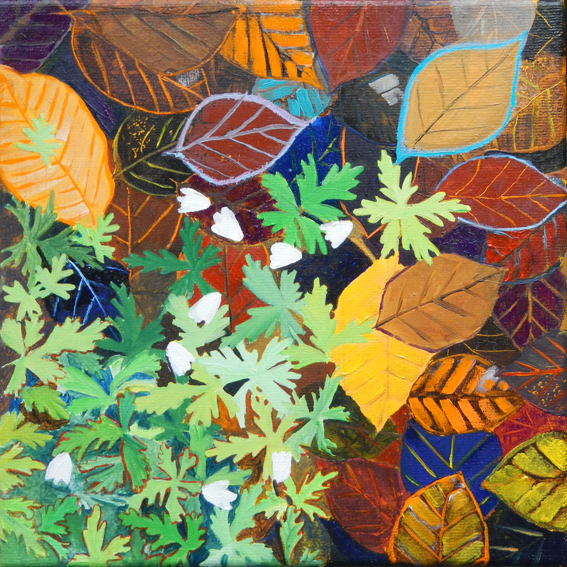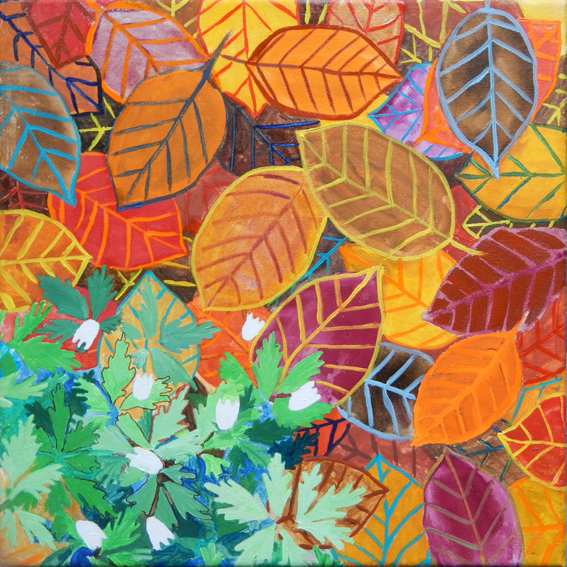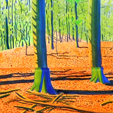Am Anfang
eines jeden Bildes steht das Erleben eines Moments,
hier Blicke auf die noch geschlossenen Blüten von Buschwindröschen im frischen
Grün,
umgeben vom gefallenen Laub des Vorjahres.
Nachdem ich "Frühlingserwachen" fertig gestellt hatte, fing ich
mit
der Umsetzung dieser
Bildidee an. Die Skizze existierte vor oder während des Schaffensprozesses gar nicht. Ich
habe sie zur Ideenveranschaulichung voran gestellt:
4 erinnerte Blicke/Leinwände, die jeweils in
einer ihrer Ecke
einen Teil der
Buschwindröschen zeigen, umgeben vom Altlaub des Vorjahres. Das frische, leuchtende
Grün in vielen Schattierungen stellte ich mir wunderbar leuchtend im Umfeld der eher
dunklen und braunen Blätter des Herbstlaubes vom Vorjahr vor. Buschwindröschen
und ihre Blätter hatte ich ja gerade schon in "Frühlingserwachen" gemalt, damit fing ich
auf der 1. der vorgesehenen 4 Leinwände an und füllte eine Ecke. Zur Erprobung der Farbwirkung mit dem Laub fing ich an, dieses zu malen. Doch die Blätter wurden
unattraktiv,
sie sahen schmutzig aus. In einer Ecke der 2.
Leinwand
begann ich erneut mit
Buschwindröschen, hoffend auf eine Idee
für eine gelingende Laubgestaltung.
Die kam aber zu dem Zeitpunkt noch nicht, ich legte beide Leinwände beiseite. Es
entstanden "Lichter Wald", "Messbrille", danach "Vorfreudige Frühlingserinnerung".
Inzwischen hatte ich "Die geheimnisvolle Macht der Farben" (Prof. Dr. Axel Buether)
gelesen. Unter anderem schreibt er über Synästhesie. Sie bezeichnet hauptsächlich die
Kopplung z.B. zweier Modalitäten der Wahrnehmung. Für Synästhesisten stellen sich
schwarz gedruckte Buchstaben farbig dar. (s. Wikipedia). Ich bin kein Synästhetiker, aber
die Vorstellung, mir unattraktiv aussehendes Vorjahreslaub farbig wahrzunehmen
gefiel mir.
Schon bei "Vorfreudige Frühlingserinnerung" hatte ich mich entschieden, die
Baumstämme statt braun oder graubraun lieber in Gün und Blau zu malen. So wurde
der Farbkontrast zum orangen Laub am Boden gesteigert und die blauen Stämme
wirken hoch, elegant, leicht. Bei der jetzt in Arbeit befindlichen Bildidee sollten die
alten Blätter des Vorjahres am Boden eine herbstlich buntere Gestaltung erfahren. Mit
dem Gedanken viel mir das gelbes Herbstlaub von Linden, rote Blätter von Wein und
orange Blätter vom Ahorn ein. Doch warum sich auf diese Farben für die jeweilige
Blattfläche begrenzen? Blattadern und -ränder könnten doch "synästhetisch" andersfarbig
sein und in ihren jeweiligen Farben kontrastreichere Interpretationen erhalten.
Die Monate liegen gelassenen beiden Leinwände wieder
hervor holend, gestaltete ich mit
mehr Farbe Blattadern und Blattumrandungen, das passte.
Folgende Skizze mag die Bildplanung veranschaulichen:
At the beginning of every picture is the experience of a moment,
here views of the still closed flowers of wood anemones in the fresh green,
surrounded by the fallen leaves of the previous year.
After I had finished "Spring Awakening", I started to implement this picture idea.
The sketch did not exist before or during the creative process. I have put them in
front to illustrate the idea: 4 remembered glances / canvases, each showing a
part of the wood anemone in one of their corners, surrounded by old leaves from
the previous year. I imagined the fresh, bright green in many shades to be
wonderfully bright in the surroundings of the rather dark and brown leaves of the
autumn leaves from the previous year. I had already painted wood anemones and
their leaves in "Spring Awakening", so I started on the 1st of the 4 canvases and filled
a corner. To test the color effect with the foliage, I started to paint it. But the
leaves became unattractive, they looked dirty. I started again with the wood
anemones in a corner of the second canvas and hoped for an idea for a successful
foliage design. But it didn't come at the time, so I put both canvases aside. It
emerged "Lights Forest", "Measuring Glasses", then "Anticipatory Spring Memories".
In the meantime I had read "The mysterious power of colors" (Prof. Dr. Axel Buether).
Among other things, he writes about synesthesia. It mainly refers to the Coupling
e.g. two modalities of perception. For synaesthesiologists, letters printed in
black are colored (see Wikipedia). I'm not a synaesthetic, but I liked the idea
of seeing unattractive-looking last year's leaves in color.
Already with "Anticipatory Spring Memories" I decided to paint the tree trunks
in green and blue instead of brown or gray-brown. The color contrast to the
orange foliage on the ground has been increased and the blue trunks look tall,
elegant, light. In the picture idea that is now being worked on, the old leaves
from the previous year should experience a more colorful autumnal design
on the ground. With the thought the yellow autumn leaves of linden trees,
red leaves of wine and orange leaves of maple came to mind. But why limit
yourself to these colors for the respective leaf area? Leaf veins and margins
could be "synathetic" in different colors and receive more contrasting
interpretations in their respective colors. Pulling out the two canvases that had
been left for months, I designed leaf veins and leaf borders with more color, that fit.
The following sketch may illustrate the picture planning:
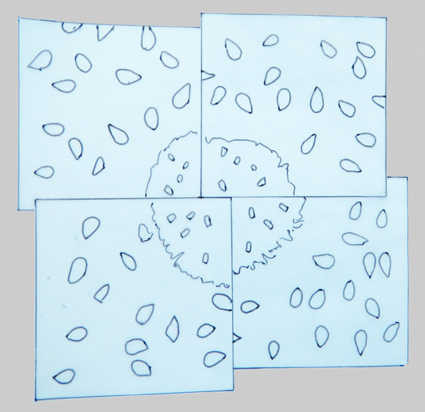
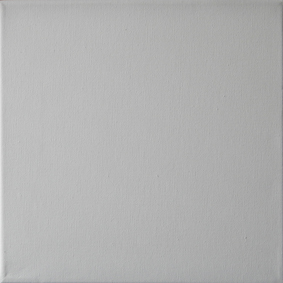
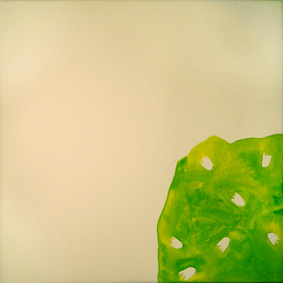
Erste Leinwand (25x25cm)
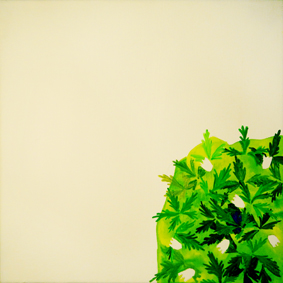
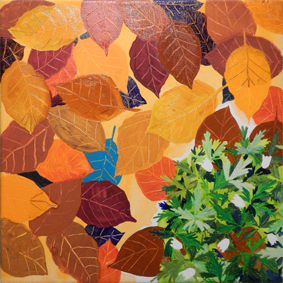
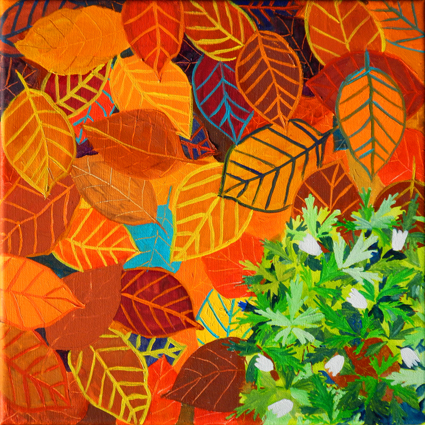

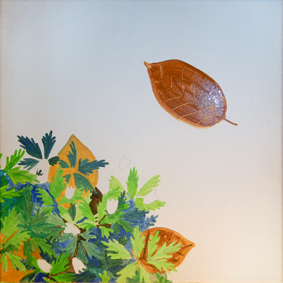
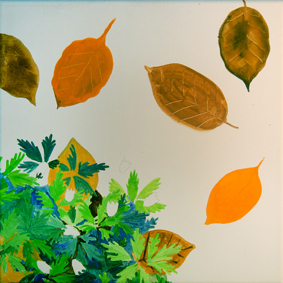
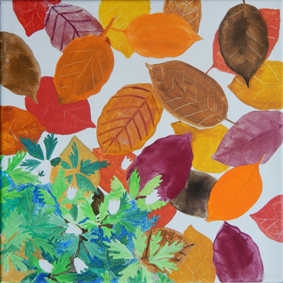
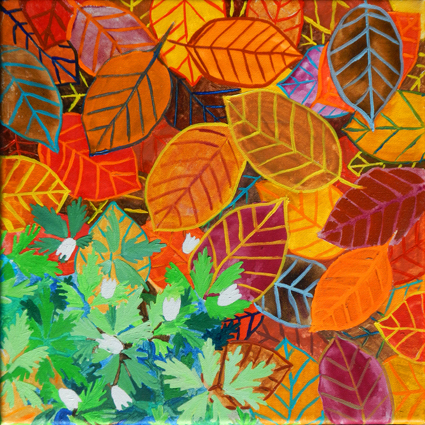

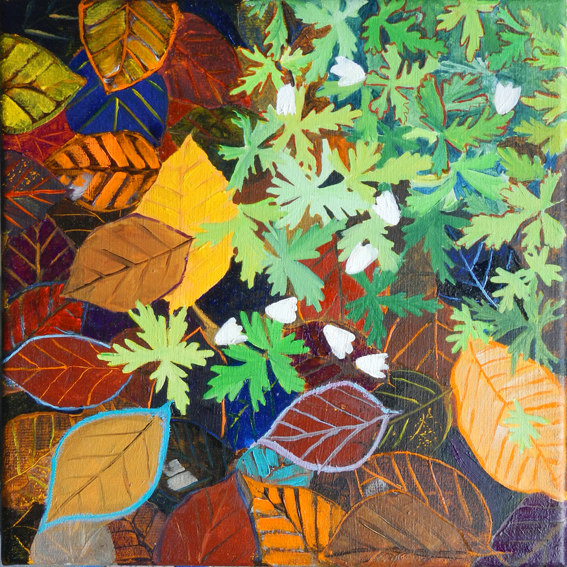

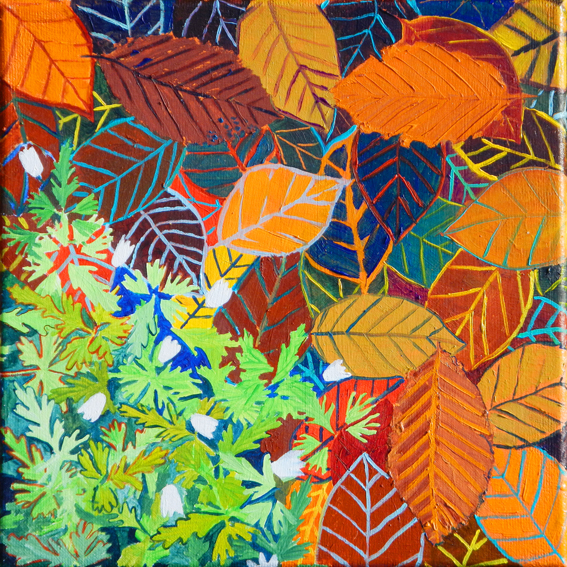
zum Trocknen.
durch Überarbeitungen in ihrer gemeinsamen Bildwirkung steigern kann. Also nochmals
Ölfarbe auf die eigentlich schon zwischengetrockneten Leinwände (s.u.).
Erneut muss die Montage warten. Gelegenheit mit Vorfreudige Frühlingserinnerung 3 zu
beginnen.
increase in their joint image effect through revisions. So again oil colour on the canvases
that have actually already been dried.
Assembly has to wait again. Opportunity to start with Anticipation with spring reminder 3.
